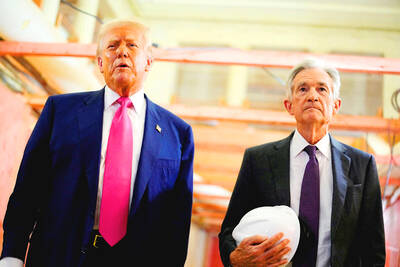A senior IMF official is set to meet with Egyptian leaders today to discuss the US$4.8 billion loan agreement that was postponed last month at Cairo’s behest because of political turmoil in the country.
The IMF’s Middle East and Central Asia Director, Masood Ahmed, will visit Cairo to meet with Egyptian officials to discuss recent economic developments and “possible IMF support for Egypt in facing these challenges,” the IMF said in a statement released on Saturday in Washington.
Major state-run Egyptian newspaper Akhbar Al-Youm reported that he would meet with Egyptian President Mohamed Mursi, Prime Minister Hisham Kandil, some ministers and the central bank governor.
Separately, Egypt’s government has sworn in 10 new ministers in a shuffle of the Cabinet aimed at better handling of the struggling economy. The top posts that changed hands yesterday were the minister of the interior — which handles the police — and the minister of finance.
The IMF loan is seen as crucial to easing Egypt’s budget deficit and an economic slump caused by the turmoil that followed the popular uprising that ousted former Egyptian president Hosni Mubarak in February 2011.
Egyptians began the new year in an atmosphere of growing anxiety, with few expecting any quick solutions as political infighting continues before a parliamentary election expected to get underway within two months.
Egypt’s currency has lost about 10 percent against the US dollar since the start of 2011.
However, about a third of that plunge has come in the past week alone since the central bank began auctioning US$75 million a day out of its reserves on Dec. 30.
Egypt’s pound slid by 0.5 percent yesterday at the central bank’s fifth auction of foreign currency, with all US$60 million on offer sold to banks at a cut-off price of 6.4185 pounds, the central bank said.
Thursday’s cut-off price was 6.3860 pounds to the US dollar. The weakening is in line with the central bank’s interbank trading band, which it narrowed on Wednesday to plus or minus 0.5 percent from the previous 1 percent.
Egyptians have rushed to buy dollars for fear of a messy devaluation, and banks have been forced to impose limits on dollar withdrawals to prevent a run on deposits.
Additional reporting by AP

IN THE AIR: While most companies said they were committed to North American operations, some added that production and costs would depend on the outcome of a US trade probe Leading local contract electronics makers Wistron Corp (緯創), Quanta Computer Inc (廣達), Inventec Corp (英業達) and Compal Electronics Inc (仁寶) are to maintain their North American expansion plans, despite Washington’s 20 percent tariff on Taiwanese goods. Wistron said it has long maintained a presence in the US, while distributing production across Taiwan, North America, Southeast Asia and Europe. The company is in talks with customers to align capacity with their site preferences, a company official told the Taipei Times by telephone on Friday. The company is still in talks with clients over who would bear the tariff costs, with the outcome pending further

NEGOTIATIONS: Semiconductors play an outsized role in Taiwan’s industrial and economic development and are a major driver of the Taiwan-US trade imbalance With US President Donald Trump threatening to impose tariffs on semiconductors, Taiwan is expected to face a significant challenge, as information and communications technology (ICT) products account for more than 70 percent of its exports to the US, Chung-Hua Institution for Economic Research (CIER, 中華經濟研究院) president Lien Hsien-ming (連賢明) said on Friday. Compared with other countries, semiconductors play a disproportionately large role in Taiwan’s industrial and economic development, Lien said. As the sixth-largest contributor to the US trade deficit, Taiwan recorded a US$73.9 billion trade surplus with the US last year — up from US$47.8 billion in 2023 — driven by strong

AI: Softbank’s stake increases in Nvidia and TSMC reflect Masayoshi Son’s effort to gain a foothold in key nodes of the AI value chain, from chip design to data infrastructure Softbank Group Corp is building up stakes in Nvidia Corp and Taiwan Semiconductor Manufacturing Co (TSMC, 台積電), the latest reflection of founder Masayoshi Son’s focus on the tools and hardware underpinning artificial intelligence (AI). The Japanese technology investor raised its stake in Nvidia to about US$3 billion by the end of March, up from US$1 billion in the prior quarter, regulatory filings showed. It bought about US$330 million worth of TSMC shares and US$170 million in Oracle Corp, they showed. Softbank’s signature Vision Fund has also monetized almost US$2 billion of public and private assets in the first half of this year,

POWELL SUCCESSOR: US Fed Governor Adriana Kugler’s resignation gives Donald Trump an opening on the board, potentially accelerating his decision on the next chair US President Donald Trump suddenly has a chance to fill an opening at the US Federal Reserve earlier than expected, after Fed Governor Adriana Kugler announced her resignation on Friday. It might also force him to pick the next Fed chair months sooner than he had anticipated. “The ball is now in Trump’s court,” LH Meyer/Monetary Policy Analytics Inc economist Derek Tang said. “Trump is the one who’s been putting pressure on the Fed to do this and that, and Trump says he wants to have his own people on. So now he has the opportunity.” Kugler’s exit unfolds amid unprecedented public pressure